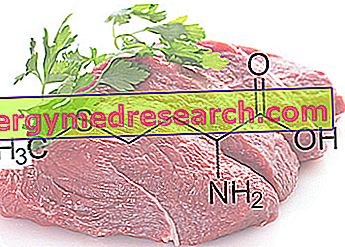Generalities and Functions
Methionine (abbreviated Met ) is an alpha-amino acid with the chemical formula HO 2 CCH (NH 2 ) CH 2 CH 2 SCH 3 and structural formula shown in the image below. It is classified as an apolar amino acid and is included in the group of so-called essential amino acids .

Together with cysteine, methionine is one of the proteinogenic sulfur amino acids.
Excluding the few exceptions in which methionine acts as a redox sensor, it is possible to define that its residues do not play any catalytic role; on the contrary, in cysteine residues, the thiol group can assume the role of catalyst.
There are also metabolically active derivatives of methionine. The most important is undoubtedly the S-adenosyl methionine (SAM), a cofactor that plays the role of methyl donor. Some enzymes use SAM to initiate a radical reaction (radical SAM enzymes), which is fundamental in bacterial chemotaxis .
Methionine (together with lysine ) participates in the synthesis of carnitine, is involved in the production of melatonin, plays a chelating function on certain heavy metals and, if present in sufficient quantities, acidifies the pH of urine helping to prevent some types of renal lithiasis.
It is necessary to keep in mind that the sulfur element is essential for the production of articular cartilage, of which methionine and cysteine are rich. If this is insufficient, negative effects can occur in the long term. Moreover, people suffering from rheumatoid arthritis, in lack of sulfur, risk complaining of a worsening of their pathological condition.
Methionine and foods
Methionine is present in good quantities: in eggs, sesame seeds, Brazil nuts, fish, meat and other seeds (even in cereals).
Most fruits and vegetables, as well as legumes, contain very little.
It is also good to remember that the biological function of methionine subordinates to cystine, therefore, from the plastic point of view, a protein can be completed only when both are present. Sometimes, racemic methionine is added as an ingredient in pet food for pets.
Methionine restrictions
It is scientifically proven that reducing methionine consumption can extend the life of some organisms.
A 2005 study on the restriction of methionine consumption, not linked to the decrease in total caloric intake, resulted in an increase in average life in mice.
Another research published in "Nature" showed that by adding only methionine to the diet of fruit flies, already subjected to dietary restriction (including other essential amino acids), these have restored fertility without reducing the increase in average life (typical of caloric restriction). This has led researchers to hypothesize that methionine adversely affects lifespan in combination with another or more essential amino acids.
Several studies have shown that methionine dietary restriction inhibits the pathological processes of aging in mice and colon carcinogenesis in rats.
In humans, methionine dietary restriction could be achieved by following a vegan-type diet. Being completely based on plant foods, this diet is generally low in methionine; however, some types of dried fruit and legume contain a fair amount.
A 2009 study in rats showed that "in rat liver cells, the methionine dietary supplement increases the mitochondrial production of ROS, favoring the oxidative damage of DNA within the mitochondria; this is a mechanism that would justify the 'hepatotoxicity. "
However, since methionine is an essential amino acid, it must never be removed from the diet of healthy subjects; this would still increase the risk of premature death. For example, rats fed a methionine-free diet develop steatohepatitis (fatty liver) and anemia, moreover, they show a weight loss equal to 2/3 of their weight in just 5 weeks. The administration of methionine is able to rapidly improve the clinical picture of the deficiency.
Methionine could also be essential in reversing methylation damage (possibly caused by repeated stress exposure) on glucocorticoid receptors in the central nervous system, with significant implications for depressive symptoms.
Other Implications in Health
Methionine loss was related to senile graying of hair. Its deficiency would induce an accumulation of hydrogen peroxide in hair follicles, a reduction in the effectiveness of tyrosinase and a gradual loss of hair color.
Methionine is an intermediate in the biosynthesis of cysteine, carnitine, taurine, lecithin, phosphatidylcholine and other phospholipids.
Methionine can be obtained from homocysteine, an intermediate product of the synthesis of cysteine, whose accumulation in the blood is considered a possible risk factor for atherosclerosis. Improper conversion of methionine can therefore lead to increased chances of cardiovascular impairment.
Veterinary Uses
DL-methionine is sometimes used as a food supplement for dogs. This amino acid, which significantly lowers the pH of the urine, would help them maintain their health even by eating potentially contaminated grass. Put simply, in dogs the racemic methionine reduces the possibility of renal lithiasis and exerts a chelating action on heavy metals such as: mercury, lead and cadmium, removing them from the body.
Methionine is also known to increase the urinary quinidine excretion. However, the aminoglycoside antibiotics used to treat urinary tract infections work best in alkaline conditions, which is why urinary acidification with methionine could reduce its effectiveness.
If the dog follows a diet that acidifies the urine in itself, methionine supplementation is contraindicated.
Methionine supplements
Despite the controversies over the alleged effects of methionine in the health sector, the amino acid is commonly sold in the form of a food supplement.
Methionine is proposed to users for its function as a precursor of SAM (S-Adenosyl Methionine) and for its catalysing effect in methylation reactions. In practice, methionine supplements should promote the elimination of metabolic waste products; a sort of purifier that affects drugs, hormones, etc.
Being a product that acidifies urine, methionine supplements are often associated with blueberry to prevent or attempt to cure urinary tract infections (such as cystitis); moreover, it seems to prevent the formation of kidney stones that develop in the presence of basic urine (calcium phosphate, calcium carbonate, magnesium phosphate and struvite concretions).
Methionine supplements are also sold as hair and nail fortification agents; the structural effect would be attributable to the ability of methionine to form sulphurous chains linked to each other and, according to some studies, it seems that their assumption can accelerate their growth.
Many other functions are also attributed to the integration of this amino acid; however, many of these have not been proven. In fact, if the metabolic implications of this amino acid and its derivatives are clear, it is not as clear if increasing their circulating levels could have a positive effect on the relative physiological processes.
Obviously, since it is an amino acid particularly present in foods of animal origin but lacking in those of vegetable type, methionine is recommended especially in the case of a vegan diet, in order to guarantee the minimum recommended intake.
Methionine is commonly found in 500mg capsules, to be taken once a day and between meals; commercial entities suggest their association with some B-complex vitamins (cobalamin, pyridoxine and folic acid) to promote the physiological synthesis of articular cartilage.
Methionine, complex with selenium, is used as an organic form of this mineral with potential antioxidant activity.
Side effects
The pharmacological excess of methionine can induce hyperhomocysteinemia, neoplastic alterations and brain damage.
Furthermore, for subjects with hepatic impairment, excessively increasing methionine intake could worsen the pre-existing condition.
In the same way, those who tend to metabolic acidosis should avoid taking this basically acidifying amino acid.



